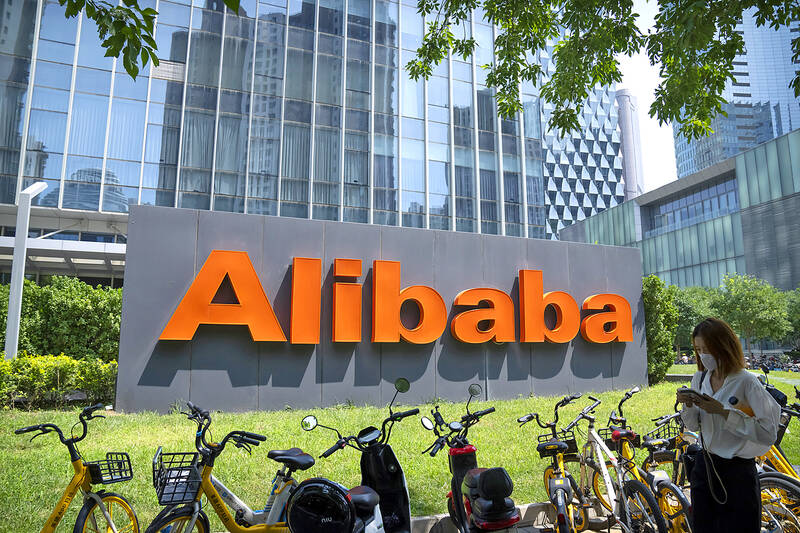Alibaba Group Holding Ltd’s (阿里巴巴) AliExpress (全球速賣通), an e-commerce site, has signed former England soccer captain David Beckham as a brand ambassador, as it plays catch-up with rival PDD Holdings Inc’s (拼多多) Temu in a battle to sell cheap made-in-China goods to the world.
Alibaba is now investing aggressively to boost global sales, as domestic e-commerce growth wanes. Its international division, which includes AliExpress, is its fastest growing unit, with revenues surging 45 percent year-on-year in the period of January to March.
Earlier this year, AliExpress also signed on as a sponsor of the UEFA Euro 2024 soccer tournament, which starts next month. It would be investing millions of dollars in discounts, deals and engagement to attract online consumers.

Photo: AP
An advertisement campaign featuring Beckham would run in conjunction with the UEFA tournament and encourage consumers to “score more with AliExpress,” the e-commerce platform said in a statement yesterday.
This comes after Temu’s success when it aired multiple commercials at the Super Bowl this year encouraging US consumers to “shop like a billionaire.”
Temu’s app downloads jumped by 34 percent on Super Bowl Sunday from the day before, mobile intelligence firm Apptopia said.
“Football, soccer fans (in Europe and) Latin America are a similar demographic to American football fans in North America, they are generally going to include a lot of price-sensitive, inflation-impacted consumers,” said Humphrey Ho (何俊軒), US managing partner at digital advertising agency Hylink Digital Solutions Co Ltd (華揚聯眾), about the decision by Temu and AliExpress to focus on football and soccer fans.
Alibaba has long looked at the overseas market as a potential money maker.
The company aims to serve 2 billion global consumers by 2036, company founder Jack Ma (馬雲) said in 2017. However, it has to make up ground in many markets it has ceded to rival Temu.
Temu, which sells US$5 earbuds and US$10 dresses among other things to more than 60 global markets, has grown in popularity since its 2022 launch.
Investment management firm China International Capital Corp (中國國際金融) estimated that Temu raked in US$18 billion in revenue last year.
To better compete with rivals, Alibaba is utilizing its competitive advantages, offering a five-day delivery window to 11 markets for a selection of products, backed by its investments in global logistics.
AliExpress has a presence in more than 100 markets, and Alibaba has the will and the money to pump AliExpress’ growth, said Jianggan Li (李江玕), founder and CEO of Momentum Works (墨騰創投), a Singapore-based venture and insights firm.
Most importantly, the competitive landscape is forcing the issue, changing the dynamics of cross-border e-commerce from China, Li said.
“AliExpress has to find a way to compete with and differentiate from Temu” to win market share, Li said.
“I mean, there’s no other choice,” Li added.

Intel Corp chief executive officer Lip-Bu Tan (陳立武) is expected to meet with Taiwanese suppliers next month in conjunction with the opening of the Computex Taipei trade show, supply chain sources said on Monday. The visit, the first for Tan to Taiwan since assuming his new post last month, would be aimed at enhancing Intel’s ties with suppliers in Taiwan as he attempts to help turn around the struggling US chipmaker, the sources said. Tan is to hold a banquet to celebrate Intel’s 40-year presence in Taiwan before Computex opens on May 20 and invite dozens of Taiwanese suppliers to exchange views

Application-specific integrated circuit designer Faraday Technology Corp (智原) yesterday said that although revenue this quarter would decline 30 percent from last quarter, it retained its full-year forecast of revenue growth of 100 percent. The company attributed the quarterly drop to a slowdown in customers’ production of chips using Faraday’s advanced packaging technology. The company is still confident about its revenue growth this year, given its strong “design-win” — or the projects it won to help customers design their chips, Faraday president Steve Wang (王國雍) told an online earnings conference. “The design-win this year is better than we expected. We believe we will win

Chizuko Kimura has become the first female sushi chef in the world to win a Michelin star, fulfilling a promise she made to her dying husband to continue his legacy. The 54-year-old Japanese chef regained the Michelin star her late husband, Shunei Kimura, won three years ago for their Sushi Shunei restaurant in Paris. For Shunei Kimura, the star was a dream come true. However, the joy was short-lived. He died from cancer just three months later in June 2022. He was 65. The following year, the restaurant in the heart of Montmartre lost its star rating. Chizuko Kimura insisted that the new star is still down

While China’s leaders use their economic and political might to fight US President Donald Trump’s trade war “to the end,” its army of social media soldiers are embarking on a more humorous campaign online. Trump’s tariff blitz has seen Washington and Beijing impose eye-watering duties on imports from the other, fanning a standoff between the economic superpowers that has sparked global recession fears and sent markets into a tailspin. Trump says his policy is a response to years of being “ripped off” by other countries and aims to bring manufacturing to the US, forcing companies to employ US workers. However, China’s online warriors